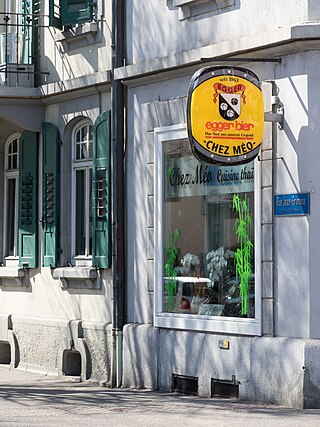
Labatt Brewing Company Limited is a Belgian-owned brewery headquartered in Toronto, Ontario, Canada. Founded in 1847, Labatt is the largest brewer in Canada.
The Molson Brewery is a Canadian-based brewery based in Montreal and was established in 1786 by the Molson family. In 2005, Molson merged with the Adolph Coors Company to become Molson Coors.
Unibroue is a brewery in Chambly, Quebec, Canada, that was started by Serge Racine and Quebec native André Dion. The company was purchased by Sleeman Breweries Ltd. in 2004, which was itself taken over by Sapporo in 2006.

Beer was introduced to Canada by European settlers in the seventeenth century. The first commercial brewery was La Brasseries du Roy started by New France Intendant Jean Talon, in Québec City in 1668. Many commercial brewers thrived until prohibition in Canada. The provincial and federal governments' attempt to eliminate "intoxicating" beverages led to the closing of nearly three quarters of breweries between 1878 and 1928. It was only in the second half of the twentieth century that a significant number of new breweries opened up. The Canadian beer industry now plays an important role in Canadian identity, although globalization of the brewing industry has seen the major players in Canada acquired by or merged with foreign companies, notably its three largest beer producers: Labatt, Molson and Sleeman. The result is that Moosehead, with an estimated 3.8 percent share of the domestic market in 2016, has become the largest fully Canadian-owned brewer.
Carling O'Keefe was a brewing company in Canada that is now part of Molson Coors. The company's origins can be traced to Canadian Breweries, which bought the Carling Brewery in 1930 and the O'Keefe Brewery in 1934. Canadian Breweries purchased numerous other brewers – some to shut down, and some solely for their brands. In 1969, Canadian Breweries was acquired by a subsidiary of Rothmans, which renamed the company as Carling O'Keefe in 1973. The company was sold in 1987, then merged with Molson in 1989.

McAuslan Brewing is a Canadian brewery opened in January 1989, and its headquarters located in Montreal, Quebec, Canada. After Moosehead Breweries Limited became a major shareholder, the brewery expanded into a new facility in 2002. McAuslan is still located on St-Ambroise street in the St-Henri borough and currently produces approximately 70,000 HL of beer annually.

Saison is a pale ale that is highly carbonated, fruity, spicy, and often bottle conditioned. It was historically brewed with low alcohol levels, but modern productions of the style have moderate to high levels of alcohol. Along with several other varieties, it is generally classified as a farmhouse ale.
This article covers various topics involving alcoholic drinks in Canada. The Government of Canada defines an alcoholic drink as "a beverage containing 1.1% or more alcohol by volume."
Dow Breweries was a brewery based in the province of Quebec, Canada. The company was founded by William Dow (1800–1868). The Dow Brewery eventually came under the control of National Breweries of Quebec in the 1920s, which itself was bought out in 1952 by Canadian Breweries. After Canadian Breweries became Carling O'Keefe and merged with Molson Breweries, its brands were discontinued in 1997.
La Barberie is a brewery in the Saint-Roch district of Quebec City, Quebec, Canada. They have a few commerce points around the province of Quebec and are visible each year at the Mondial de la Bière in Montreal, Quebec.

Canadian Breweries Limited (CBL), originally the Brewing Corporation of Ontario, was an Ontario-based holding company in the brewing industry. The company was founded in 1930 by a merger of two breweries, Brading of Ottawa and Kuntz of Kitchener-Waterloo. Under the direction of its top executive, E. P. Taylor, the company bought or merged many of the smaller competitors existing after the repeal of prohibition. The new company closed many plants, reduced the number of beer brands and built new, larger plants to produce enough beer for a much larger geographic area. By the 1950s, the company had reduced the number of beer brands from approximately one hundred to six. Canadian Breweries became part of a large conglomerate of manufacturing and consumer businesses controlled by the Argus Corporation in 1945.
Les brasseurs du Nord(The Brewers of/from the North) is a brewery just north of Montreal, in Blainville, Quebec, Canada.
Les Brasseurs RJ is a brewery located in Montreal, Quebec, Canada. The company was founded in 1998 by Roger Jaar from the merger of three microbreweries: Les Brasseurs GMT, La Brasserie Le Cheval Blanc and Les Brasseurs de l'Anse. Current annual production capacity is over 125,000 hL; they claim to be the largest microbrewery in Quebec. They currently employ 450 people, including employees at the head office in Montreal, a distribution centre in Quebec City, and a brewery in l'Anse St-Jean that fills beer kegs.
Le Cheval Blanc is a brewpub located on rue Ontario in Montreal, Quebec, Canada. In 1986, it became the first licensed brewpub in Montreal.

Beau's All Natural Brewing Company, also known as Beau's Brewing Company or simply Beau's, is a brewery in Vankleek Hill, Ontario, 50 minutes east of Ottawa.

Most beer sold in France is pilsner lager, mass-produced by major breweries which control over 90% of the market, although there are also traditional beer styles, such as top-fermented Bière de Garde, and a number of microbreweries.

The Bertinchamps brewery, also known as brasserie de la Ferme de Bertinchamps, is a Belgian family-run microbrewery located in Gembloux, in the Belgian province of Namur. It brews three types of beer named Bertinchamps, which are a recognized part of Belgian beer culture. Its primary export markets are Russia, China, Japan, Ireland and France. In April 2017 it made the national news in Belgium for producing 3D-printed chocolate beer bottles.

La Goudale is a bière de garde which was originally brewed in Douai by Les Brasseurs de Gayant. The brewery has since moved to Arques.

Switzerland straddles the border between the beer-loving central European countries and the wine-loving western European and Mediterranean countries and today beer is second to wine in terms of consumption among Swiss. The country has a long tradition of brewing, with significant domestic beer production and a growing craft brewing sector.











